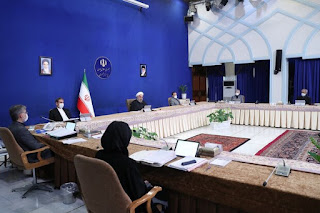This year, Iran's annual hatefest called Quds Day this Friday is
only online because of the pandemic.
Ahead of that holiday, which was created as a response to Jerusalem Day, Iranian media - which is all government approved - is proving quite definitively that its problem isn't with Zionism, but with Jews.
The headline of this
Al Alam TV article says that the Arabs in the Sheikh Jarrah neighborhood of Jerusalem are threatened by "the fangs of jungle monsters" - their woke term for Jews.
A
lengthy article at PressTV (English) goes over a twisted history of Israel and features an interview with Lebanese academic Denijal Jegic, a frequent contributor to
Al Jazeera. This expert confidently tells us that Jewish history is a lie:
This whole Zionist narrative is really just based on myths and ways to construct the history and the connection to the land that was not there before the settler colonial movement...I'm not surprised to hear that the Zionist regime is having their own [Jerusalem] day because it's also a way for them to inscribe themselves into Palestine and to construct the connection to the land that wasn't there before.
Jegic once wrote a chapter to a book whose
abstract reads, "This chapter explores the inclusion of Palestine within Transnational American Studies and discusses how intersectional and transnational understandings of the Palestinian intifada can be applied for the analysis of subaltern forms of expression. While the impossibility to effectively differentiate between US and Israeli hegemony has transformed Palestinians into a contemporarily transnationally colonized people, discussions on settler-colonialism and ethnic cleansing, while formerly absent from American Studies, were articulated by Black activists and artists, who voiced a transnationalization of the Palestinian intifada as a revolutionary intervention into hegemonic concepts. In order grasp the potential of artist-activist work, and in order to expand the decolonial discourse, Transnational American Studies needs to combine the analysis of political, economic, and military components of transnational hegemony with the highlighting of counter-hegemonic articulations of resistance."
Good to know his antisemitism is well-grounded in the latest intersectional motifs and transnationalist narratives.
Rouhnai [sic] termed the Zionists as the enemies of the region and its security, the enemies of the Palestinian nation, the murders [sic] who displaced millions of civilians.
He went on to say that during the past decades, nobody has been such criminal [sic] as the Zionists are.
Millions of civilians displaced!
More civilians were killed by Iran in the Iran-Iraq war than were killed in the past hundred years of conflict in Israel.


 Elder of Ziyon
Elder of Ziyon























